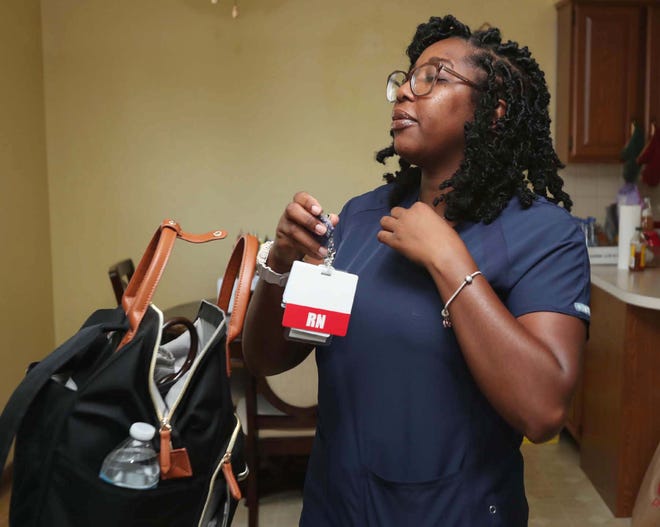

In January Shavon Hall received an offer letter to work in Cleveland Clinic's intensive care unit. She was elated, and she hoped to begin working a few weeks after graduating nursing school in May to help fight COVID-19.
Instead, she had to push back her start date three times.
Hall finally got her registered nurse license at the end of July, four months after submitting an application to the Ohio Board of Nursing in April.
"The board of nursing took forever," said Hall. "I was frustrated, because it was like a waiting game, and then just not having any answers about what was going on."
Hall is not alone. She's among many who have complained in the past year about the long processing times and the inability to reach anyone at the nursing board.
With the renewal period for nursing licenses currently underway, it's one more barrier amid a COVID-19 pandemic that has exacerbated nursing shortages in hospitals and nursing homes.
Multiple causes for delays
Hall said before the pandemic, it wasn't like this. When she obtained her licensed practical nurse (LPN) license in 2019, it only took a little more than two weeks.
Some out-of-state nurses have also said that Ohio was now taking a particularly longer time to process applications compared to other states.
The state nursing board pinned the blame of any delays on the COVID-19 pandemic itself. For one, new Ohio laws intended to combat the virus and increase staffing caused more administrative burden, it said.
From March 2020 until this past July, House Bill 197 and House Bill 6 required the nursing board to issue temporary licenses to nursing program graduates without any licensure examination. That helped cause a 35% increase in the number of applications the board received in much of 2020 over the prior year, at nearly 17,000 applications.
It "required additional manual processes of license applications by a very limited number of licensure staff and necessitated staff to focus on these exam applications," said the nursing board in a written response to questions from the USA TODAY Network Ohio bureau.
Those temporary licenses expired July 1, and leading up to that date, there were more and more applications to make those licenses permanent. Cassandra Porter, a registered nurse working at a Rocky River nursing home, was one of them.
She had already gotten a temporary license late last year before moving to Ohio from Arizona. Porter completed her criminal record checks in February and grew nervous waiting for them to be processed when the end of June neared.
The nursing board confirmed that technical issues also played a role in delays, specifically with Ohio's Bureau of Criminal Investigation. In May, BCI implemented computer system changes "that are still being resolved," the board said, impacting criminal record checks.
The board also pointed to budget and hiring freezes during the pandemic as a reason for delays.
State employee count data, however, shows the employee count has remained relatively stable before and during the pandemic for the board, hovering near or above 80 employees.
Hard to reach
The biggest frustration for nurses waiting for licensure was the inability to get a hold of someone at the board.
Porter said that after she worried about how long her background checks were taking, she called the board. She got a message saying nobody was in the office and to send an email instead.
"I started in probably May or June, emailing the state board every single week, saying 'Hey, where's my license?'" said Porter. "And I got zero response."
With the deadline closing in, Porter went to her state lawmaker on the advice of her mother. Within three days, she got her license.
"It shouldn't take reaching out to my state representative to get my license," she said.

Hall went through more hassle. She called around 15 times before finally talking to a live person. On five occasions, she was put on hold, each time lasting two to three hours. Two of those times, the call abruptly hung up.
On the phone, she was told her information would be forwarded to a supervisor. She never heard back. So she began sending emails, and after multiple attempts and long waits, Hall was able to get her examination number and license.
"Trying to call and get in touch with someone was like non-existent. It was always like, 'We're experiencing high phone calls right now; call back at a later time,'" said Hall.
The increased amount of applications and limited staff are why communication hasn't been up to par, according to the nursing board.
"There are periods of time when the board has prioritized the issuance of licenses over answering telephone calls," it said. "The rationale is that by far, the most common call is to ask when a license will be issued."
The agency has no staff solely dedicated to answering calls and emails because all seven of its license employees are needed to process applications, it said.
The Ohio Nursing Board noted that it handles one of the largest number of licensees in the state yet is understaffed compared to other agencies with fewer licensees. For instance, as of last summer, the Ohio State Medical Board had ten more employees but regulates roughly a third of the Nursing Board's more than 300,000 licenses.
Additional stress on nurses
The board, according to its own data, has performed relatively well considering the conditions. Between March 2020 and the end of June, more than 93% of all 33,611 applications and license reinstatements submitted were fully processed.
That doesn't mean the longer waiting times have no negative impacts.
Hospitals have open positions in a time where staffing shortages have worsened under the pandemic's pressures. Because of the Ohio Nursing Board, those positions have to be empty for months.

Local hospitals didn't answer requests for comment. The Ohio Hospital Association said through a spokesperson that the nursing board "has been responsive to the need to expedite the licensure process."
But anecdotally and on social media, some workers have complained about their staffing situations and how waiting months for someone to get licensed isn't helping.
"The Ohio Nurses Association is sympathetic to nurses whose frustrations have been compounded by the Ohio Board of Nursing and we realize something must change," said Deborah Arms, association president. "Ohio needs nurses at the bedside, and we can’t afford any delays with our licensing board."
Nursing home groups confirmed that such incidents have happened with them, too.
"Members had to make do without enough nurses or using agency nurses during the delay," said Pete Van Runkle, head of the Ohio Health Care Association. "More recently, we’ve had some success reaching out to the board for our members and getting things expedited."
The months-long wait is causing stress for nurses and soon-to-be nurses. For some, it feels frustrating not being able to jump into the field after so much time spent studying and paying for a nursing career. For others, not being able to get a license means being jobless.
Porter was especially anxious about her temporary license expiring. While her RN license from Arizona meant she could still practice under Ohio's COVID-19 emergency declaration, she was unsure if that was the case and feared being out of a job.
"It's like, we're expected to take care of these patients, but you're not taking care of us," she said. "We pay money for our license. We've paid for our background checks. You're not getting something you're paying for, honestly, it's inexcusable."
Nursing board plans to increase staff, other fixes
The hope from the state government is such delays will be mostly remedied in the near future as budget and hiring freezes lift.
Over the summer, the nursing board was also approved to raise its personnel ceiling by six full-time positions, said a spokesperson for the Ohio Department of Administrative Services.
The additional staffing could include full-time workers dedicated to answering calls. The board is hiring personnel "as quickly as possible," it said.

On the communication front, a new application that would improve call times was recently implemented in June for the nursing agency, and state officials expect that will boost customer experience over time.
Changes to the electronic licensing process are constantly in the works, the Ohio Nursing Board said, from giving applicants the ability to check on the status of their application online to no longer requiring certain documents at the time of licensure.
The board said it's continuing to look at ways to further automate the licensing process, as it's been the manual processes that have stalled granting licenses.
With the licensure process behind her, Hall is looking forward to starting her new job this month and pursuing her passion for nursing.
She hopes, however, that no one else will have to go through what she went through.
"Nursing school was tough," Hall said. "Just waiting for my number and just trying to hear back from the board of nursing, I feel like that was more frustrating than actual nursing school."
Titus Wu is a reporter for the USA TODAY Network Ohio Bureau, which serves the Columbus Dispatch, Cincinnati Enquirer, Akron Beacon Journal and 18 other affiliated news organizations across Ohio.
Source link








